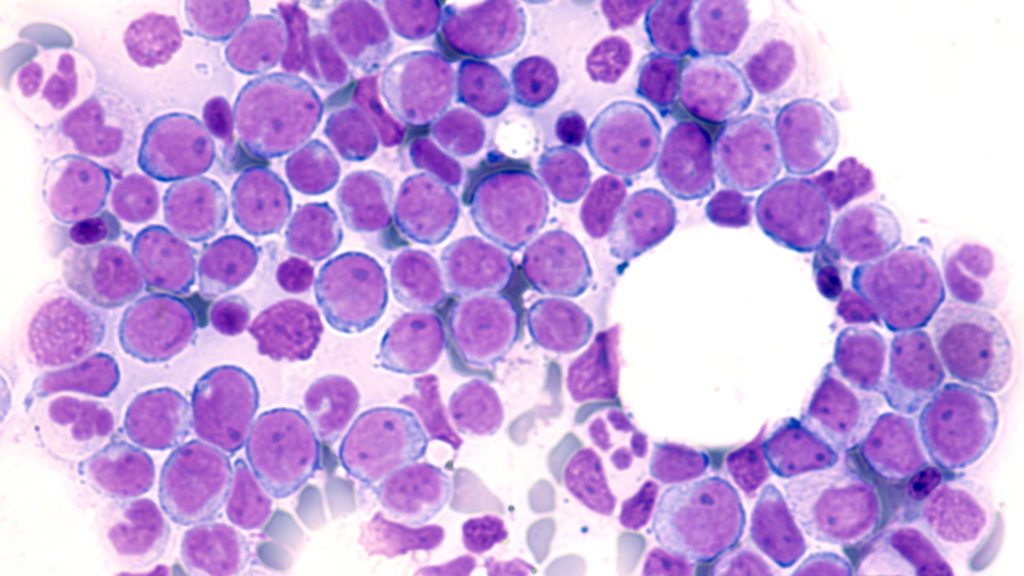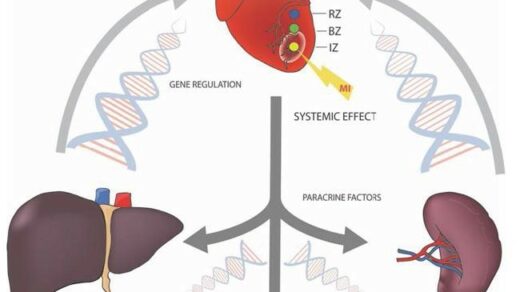In the cover paper chosen for Oncotarget’s Volume 12, Issue 10, researchers investigated the efficacy of Tomivosertib in pre-clinical models of acute myeloid leukemia (AML).

Acute myeloid leukemia (AML) is a cancer of the blood—which begins in the bone marrow, stunts normal cell growth, and leads to excess immature cells. AML is associated with a very poor overall survival rate and, among adult patients, AML is the second most common form of leukemia.
While chemotherapy has been the mainstay treatment for AML, advancements in next-generation sequencing technologies and an improved understanding of genomic alterations in the genesis of leukemia have changed the treatment landscape. In recent years, several new therapeutic approaches have been developed that target specific mutations in AML and function synergistically with available chemotherapeutic treatments. Despite these advancements, AML relapse due to drug resistance continues to challenge patients, doctors, and researchers.
“Even though these therapies have increased at variable degrees the response rates and survival benefit of subgroups of AML patients [8–11]; the development of resistance towards these novel drugs and subsequent relapse remains one of the major challenges for the treatment of this disease [12].”
Researchers, based out of Chicago, Illinois, U.S., from Northwestern University’s Robert H. Lurie Comprehensive Cancer Center, Northwestern University Feinberg School of Medicine, and Jesse Brown Veterans Affairs Medical Center conducted a new study to assess the efficacy of Tomivosertib to regulate the eIF4E binding protein in AML. Their paper was chosen as the cover of Oncotarget’s Volume 12, Issue 10, and entitled, “Inhibitory effects of Tomivosertib in acute myeloid leukemia.”
Why Tomivosertib?
“eIF4E has been demonstrated to be overexpressed in AML [18, 19] and has been linked to malignant cell transformation and proliferation [19–23].”
The eukaryotic translation initiation factor 4E (eIF4E) is a cap-binding protein that has been demonstrated to be overexpressed in AML. The activation of eIF4E is controlled by mitogen-activated protein kinases 1 and 2 (MNK1/2). Researchers in this study believe that Tomivosertib, a highly selective MNK1/2 inhibitor (currently undergoing clinical trials for the treatment of patients with advanced solid tumors and lymphomas), may be a viable therapeutic option for the treatment of AML.
“An alternative means to target oncogenic eIF4E activity, is by preventing its phosphorylation by MNK1/2 [24, 25, 56].”
The Study
In this study, the researchers purchased Tomivosertib (and Venetoclax) from TargetMol. They cultured AML cell lines, used clonogenic leukemic progenitor assays in methylcellulose, cell viability assays, cell lysis and immunoblotting, co-immunoprecipitation assays, plasmids and transfections, and conducted proteomics immunoprecipitation analysis using liquid-chromatography-tandem mass spectrometry, gene annotation and protein function enrichment analysis, and statistical analysis.
Results
The team found that Tomivosertib inhibits eIF4E phosphorylation and decreases leukemic cell survival and proliferation. The researchers also found that Tomivosertib synergistically enhances the anti-leukemic effects of Venetoclax against AML cells in vitro.
“Our data also demonstrate that the combination of Tomivosertib with Venetoclax enhances the anti-leukemic responses in mutant p53-expressing AML cell lines.”
Their liquid-chromatography-tandem mass spectrometry analysis identified putative MNK1/2 targets and interactors, including 16 proteins interacted with MNK1, 10 proteins interacted with MNK2 and 24 proteins interacted with both MNK1 and MNK2.
Conclusion
In summary, the results from this study indicate that MNK1/2 inhibition would most likely be a successful strategy in a subset of AML patients. The researchers note that it will be crucial for future studies to determine which pathways are responsible for sensitivity to MNK inhibitors.
“These studies will help to identify potential regulatory programs through which MNK1/2 modulates cell signaling pathways critical for leukemic cell survival and may lead to the development of novel therapeutic interventions for AML.”
Click here to read the full scientific study, published by Oncotarget.
—
Oncotarget is a unique platform designed to house scientific studies in a journal format that is available for anyone to read—without a paywall making access more difficult. This means information that has the potential to benefit our societies from the inside out can be shared with friends, neighbors, colleagues, and other researchers, far and wide.
For media inquiries, please contact media@impactjournals.com.



